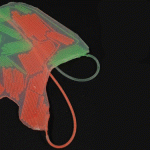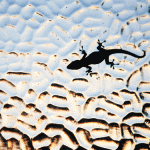
These findings could help mop up oil slicks such as the one created by the 2010 disaster. Image: Chi Phan
A new way to clean up oil spills that threaten our oceans.
Two years ago the explosion of the Deepwater Horizon oilrig covered hundreds of square kilometres of the Gulf of Mexico with oil. Oil floats on water because it is less dense than the latter, but according to scientists from Curtin University water could float on oil. These findings, which were published in the journal Langmuir, could help mop up oil slicks like the one created by the 2010 disaster.
Chi Phan and colleagues from the Department of Chemical Engineering at Curtin University attempted to test whether water could float on oil by using theoretical computer models. After experimenting in the lab, they found that conventional wisdom was wrong: water can float on oil.
By adding tiny amounts of water to a floating droplet of canola oil, the researchers found that the ability of water drops to float at the surface of an oil bath depends on both the size of the droplet and the type of oil. Commercial vegetable oils have enough surface tension, a characteristic that allows them to support a droplet’s weight — the oil surface droops like a rubber membrane, allowing the air, which is much lighter than oil and water, to extend beneath the surface’s average level.
The team also found that vegetable oil could not support drops bigger than 160 cubic millimetres. The researchers suggest the new knowledge could help clean up oil spills, where waterborne, oil-eating microbes will mix more easily into the oil if suspended in the tiny droplets they describe.
“It is well-known that microbes can break down oils in the ocean,” Phan said. “These microbes are available naturally, however, to speed up the process, they need nutrients and oxygen. The water droplets in our study have concentrated microbes and nutrients for them to grow faster.”
Phan and his team will repeat the experiment on pure mineral oil, also known as liquid petroleum. He believes that the results will be similar to vegetable oils, as long as the surface tensions are right.
“These results can lead to a new and advanced mechanism in processing oil-water mixtures, such as biodegrading process of unwanted oils, including vegetable oils, sand oil tailings and oil spillages,” Phan mentioned in a statement.
Although Phan and his team do not currently have support from any private organisations, they are looking for sponsors with hopes to work in the field some time soon.
Source: Curtin University and ScienceDaily






